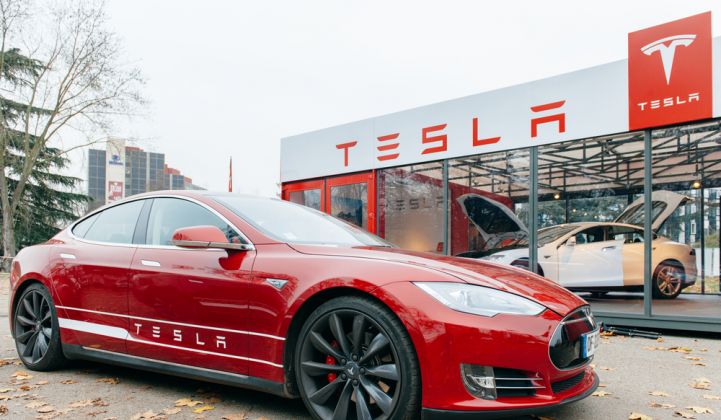Hours after Tesla CEO Elon Musk sent out tweets touting production of the company’s upcoming Model 3 car and the huge manufacturing ramp planned for it, Tesla quietly released some more down-to-earth delivery numbers for the cars it currently produces.
Tesla announced the company delivered 22,000 of its electric vehicles, including its Model S and Model X, in the second quarter of 2017. That figure is lower than the number of cars Tesla shipped in the first quarter of the year, which came in at just over 25,000.
The second-quarter deliveries bring the company's total number of cars shipped in the first half of 2017 to 47,100, which is at the low end of Tesla’s guidance for shipments for the period. As of Tesla’s latest earnings report, the company planned to ship between 47,000 and 50,000 cars in the first half of 2017.
Tesla said the slower ramp of the Model X and S was due to a “severe production shortfall” of its newer 100-kilowatt hour battery packs. Those battery packs were announced about a year ago and enable Tesla cars to drive for longer on a single charge (315 miles) and to accelerate more quickly than with previous battery packs.
The issue with the 100 kilowatt-hour batteries, which were being made “using new technologies on new production lines,” was reportedly resolved in early June. Those batteries were initially sold only on Tesla’s highest-end cars and represented about 10 percent of all production.
While there may be a clear reason for the delay, the underwhelming second-quarter deliveries are the latest illustration of how difficult it is to scale new manufacturing technologies in a car factory. Tesla’s manufacturing arrangement is vulnerable to engineering difficulties when new technology and greater complexity are introduced.
Tesla and Musk learned this the hard way with all the bells and whistles the company tried to cram into the Model X. Musk has called the Model X crossover over-engineered and said he and Tesla showed “hubris” trying to add too many complicated features to the car from the start of production.
Musk and Tesla CTO JB Straubel have said they’ve taken lessons from the Model X and applied them to the design and manufacturing of the upcoming Model 3. Musk said on the last earnings call that the Model 3 will “be roughly comparable with the best high-volume vehicle production lines in the world.” He also said, “With some further iteration, I think it will be a little bit better than the next-best automotive production line.”
Yet Tesla’s goals for the Model 3, and its overall car production goals over the next year and a half, are massive. And many people think they're unrealistic.
The company has said it plans to make 500,000 cars per year by 2018, two years earlier than its previous goal to make 500,000 cars annually. The bulk of that is supposed to come from the Model 3, but will also come from the Model X and S.
By my back-of-the-envelope calculation, Tesla has shipped about 200,000 cars to date over its entire lifetime.
It’s unclear when exactly Tesla will start moving into overdrive on production to be able to meet that 500,000 annual goal. On Monday, Musk tweeted that Tesla should be able to make 100 Model 3 cars for customers by this August, and boost that to 1,500 Model 3 cars by September.
Then, somehow, Model 3 production ramp is supposed to jump to 20,000 cars per month in December, according to Musk. Those last couple of months at the end of the year should be fun for Tesla engineers.
Musk is notorious for pushing his employees to meet very difficult goals and working beside them while doing so. During the previous slow ramp period of the Model X, Musk said he slept next to the production line until the technical issues were worked out.
Tweets aside, Tesla hasn’t yet given official guidance for how many cars it plans to ship in the second half of 2017. In the company’s last letter to shareholders, Tesla wrote: “We will provide guidance on vehicle deliveries for the second half of this year after we have started Model 3 production in July. Given that we will be ramping Model 3 production so quickly, as we’ve noted before, even a couple-week shift in timing can have a meaningful impact on total deliveries.”
Musk said on Twitter Monday that Tesla plans to complete the very first of the Model 3 cars on Friday.



